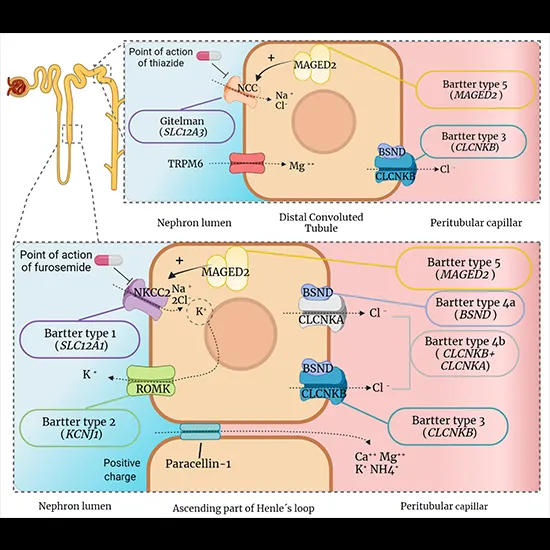
Book Bartter Syndrome Gene Panel Appointment Online Near me at the best price in Delhi/NCR from Ganesh Diagnostic. NABL & NABH Accredited Diagnostic centre and Pathology lab in Delhi offering a wide range of Radiology & Pathology tests. Get Free Ambulance & Free Home Sample collection. 24X7 Hour Open. Call Now at 011-47-444-444 to Book your Bartter Syndrome Gene Panel at 50% Discount.
A lack of potassium, sodium, chloride and associated chemicals in the body is a symptom of the group of kidney diseases known as Bartter syndrome.
Bartter syndrome occasionally shows symptoms before birth. An excess of fluid surrounding the fetus called polyhydramnios can be brought on by the condition (amniotic fluid). Premature birth is made more likely by polyhydramnios.
Affected people frequently don't grow and acquire weight at the expected rates starting in infancy (failure to thrive). They produce more urine because they lose too much salt (sodium chloride) and become dehydrated, constipated, and uncomfortable (polyuria). Moreover, excessive levels of calcium are excreted in the urine (hypercalciuria), which can damage bones (osteopenia).
The causes have grown.
At least five different gene mutations have been linked to Bartter syndrome. Type I is caused by mutations in the SLC12A1 gene. The KCNJ1 gene is the site of type II mutations. Type III is brought on by CLCNKB gene mutations. A combination of modifications in the CLCNKA and CLCNKB allele or modifications in the BSND allele can cause type IV.
The Bartter syndrome-linked genes are crucial for maintaining healthy kidney function. These genes generate proteins that aid in salt reabsorption by the kidneys. The kidneys' capability to reabsorb salt is compromised by modification in any of the five alleles which affect the loss of extra salt in the urine (salt wasting). The reabsorption of other charged atoms (ions), like potassium and calcium, is also impacted by abnormalities in salt transport. The primary characteristics of Bartter syndrome are caused by the resultant ionic imbalance in the body.
The genetic etiology of Bartter syndrome is not known in some affected individuals. Other genes that might be linked to this illness are being sought by researchers.
Providing individuals with a personal or family record suggestive of Bartter syndrome a genetic evaluation
Specifying the Bartter syndrome's reason.
Next-generation sequencing is utilized in this examination to discover single nucleotide, deletion-insertion, and copy number variations in the six Bartter syndrome-related alleles: BSND, CLCNKA, CLCNKB, KCNJ1, MAGED2, and SLC12A1.
For Bartter syndrome, finding a disease-causing mutation may help with diagnosis, prognosis, clinical care, familial screening, and genetic counseling.
| Test Type | Bartter Syndrome Gene Panel |
| Includes | Bartter Syndrome Gene Panel (Pathology Test) |
| Preparation | |
| Reporting | Within 24 hours* |
| Test Price |
₹ 20000
|

Early check ups are always better than delayed ones. Safety, precaution & care is depicted from the several health checkups. Here, we present simple & comprehensive health packages for any kind of testing to ensure the early prescribed treatment to safeguard your health.